
Is The Blood of Wolves the first salvo in an electrifying new yakuza film franchise from Toei Studios? The film’s “planning producer,” Muneyuki Kii, dares to hope so. Its director, Kazuya Shiraishi, does too. And Yuko Yuzuki, the woman whose rough-and-tumble bestselling novel, Korou no Chi, reignited the studio’s passion for jitsuroku eiga (actual record films), says, without hesitation, that Shiraishi’s the man if there are sequels in the offing.
Shiraishi and Yuzuki were at FCCJ to talk with the audience after our sneak peek of The Blood of Wolves. It marked the first time the Film Committee has hosted the author of the original novel on which a film is based, and the second time that Shiraishi has been on the dais. He was at FCCJ with four other directors to kick off the Nikkatsu Roman Porno reboot project in 2016, having directed Dawn of the Felines. It would go on to become the most successful of the five releases.
Shiraishi has explored territory similar to The Blood of Wolves in his previous high-octane actioners The Devil’s Path (2013) and Twisted Justice (2016), both of which won numerous awards. But he hits a career high with his new film. The boisterous, brutal cinematic bombshell made its world premiere in Udine, Italy at the Far East Film Festival in April and has already been booked for extensive international festival play. Should it prove to be a commercial hit at home, there’s every chance that Toei will move forward with Yuzuki’s just-released Kyouken no me (literally Eye of the Mad Dog), the second in a planned trilogy.
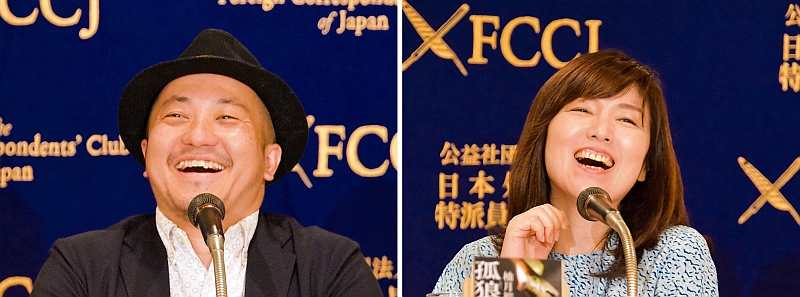
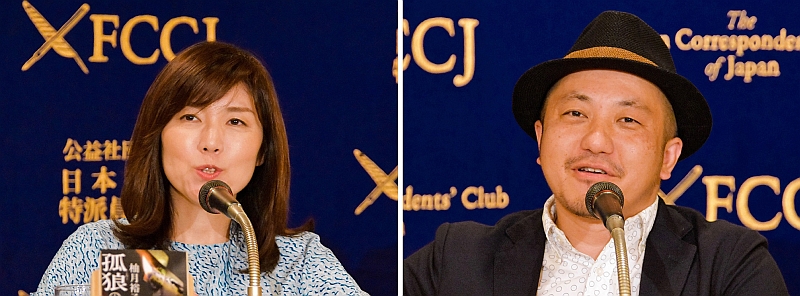
The tone was surprisingly light through most of the Q&A, a relief after the film's unrelenting intensity. ©FCCJ
After a decade of churning out popular ninkyo eiga (chivalry films) starring kimono-clad yakuza heroes played by the likes of Ken Takakura and Koji Tsuruta, Toei shifted gears in the early 1970s and introduced what came to be called jitsuroku eiga, focusing on the true stories of postwar yakuza in what film historian Jasper Sharp calls “a world of craven thugs and corrupt law enforcers… when vaunted traditional codes of behavior have been revealed as shams.” Kinji Fukusaku’s epic Battles Without Honor and Humanity (1973), which was set in Hiroshima and starred Bunta Sugawara, was explosive, spawning four sequels, another three-part series and loads of imitators.
Toei makes no bones about its intention to recapture the invigorating jolt with which that classic franchise was met. “To make a film about the wild way of life of outlaws in the Showa period in the current Heisei era is an ambitious act,” read the production notes for The Blood of Wolves. “[It’s also] a challenge to Japan’s film industry, and to modern society itself.”
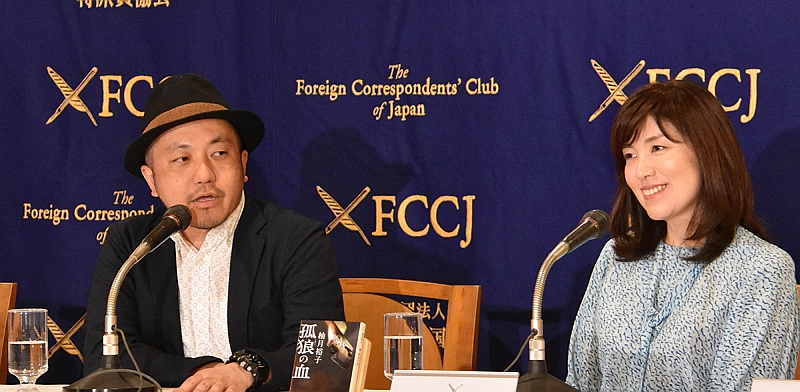
©FCCJ
The studio describes that challenge this way: “[Wolves] depicts men who traverse the boundaries between trust and betrayal, violence and desire, and justice and atrocity. In their harsh and brutal realm of existence, pride means everything. The striking catharsis and violence delivered by these men… is little seen in modern-day Japanese entertainment due to the highly restrictive nature of domestic free-to-air television and the current family-centric film environment.”
Yuzuki has admitted that if it weren’t for Fukasaku’s films, her novel would not exist: “It's a world that women can't enter even if they try, which is the very reason why it impressed me.” But responding to a question about the influence of the series on her writing, which has earned her multiple awards and widespread acclaim for her hardboiled style and meticulous attention to procedural details, she told the FCCJ audience, “The way I see the Battles Without Honor and Humanity series is, they were set in Hiroshima in the chaotic postwar period, and they weren’t so much about yakuza, but about these people and their will to survive. They were ferocious, and desperate to survive. They would kill each other, they would [really get down and dirty]. That was what really attracted me to the series. I wonder how many people in Japan today have such a passionate will to live?"
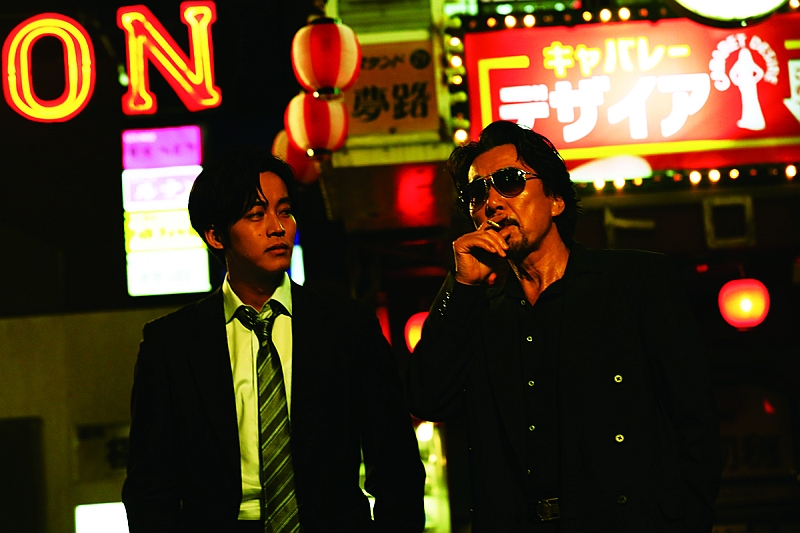
© 2018 THE BLOOD OF WOLVES Production Committee
Added the director, “Needless to say, I was a huge fan of Toei’s jitsuroku eiga, but that era has ended. It’s the type of genre that you can’t make in Japan today, so I hadn’t really given any thought to venturing into that realm myself. In the early days when I was an assistant director, there were still V-Cinema (straight-to-video) yakuza films, but I never thought I would have the opportunity to make a film like this. When they came to me with Ms. Yuzuki’s novel, it was something I hadn’t even dreamt of. I was overjoyed, and also intimidated. But I also had a certain confidence that perhaps I was the only director who was able to take on this project.”
Shiraishi’s confidence is well earned. Not only does he guide his actors to awards-worthy performances, particularly Koji Yakusho, who is electrifying as a corrupt police detective, he also directs with dizzying visual intensity. Jitsuroku eiga fans will be pleased to note the stylistic similarities in The Blood of Wolves: Shiraishi deploys Fukasaku-esque freeze frames, overtitles, narration, newspaper images and docu-style shaky cam to impressive effect.
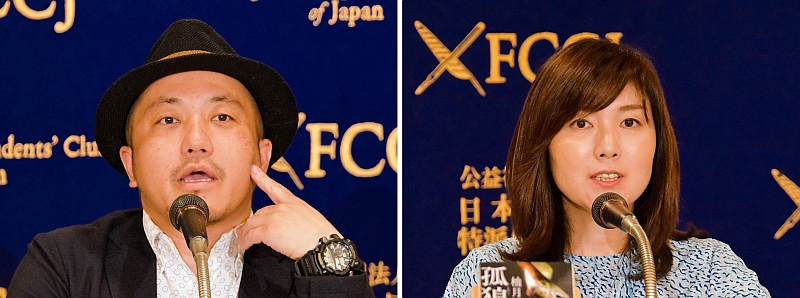
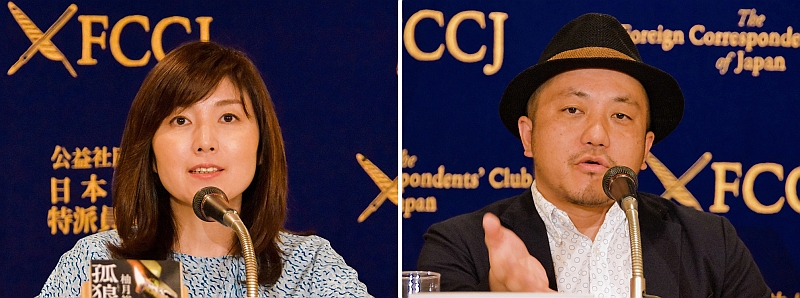
©FCCJ
“These days,” said Shiraishi, “the only yakuza films we have like Battles Without Honor and Humanity are by Takeshi Kitano, the Outrage series. Many members of the cast in this film were first-time yakuza. But they really, really seemed to enjoy it. They really put their heart and souls in it.” (With a cast that includes Yoko Maki, Takuma Otoo, Taro Suruga, Tomoya Nakamura, Junko Abe, Shido Nakamura, Yutaka Takenouchi, Kenichi Takito, Kenichi Yajima, Tomorowo Taguchi, Pierre Taki, Renji Ishibashi and Yosuke Eguchi, it’s hard to imagine which are neophytes.)
As for Yakusho, “When I was first starting out, I loved the yakuza roles he did in [V-cinema films] like Drug Connection and Osaka Gokudo Senso: Shinoidare. He was so wonderful in those roles that I wanted to bring back the yakuza Yakusho. Although he plays a detective, he’s a thug detective. But I think he’s fantastic in this film.”
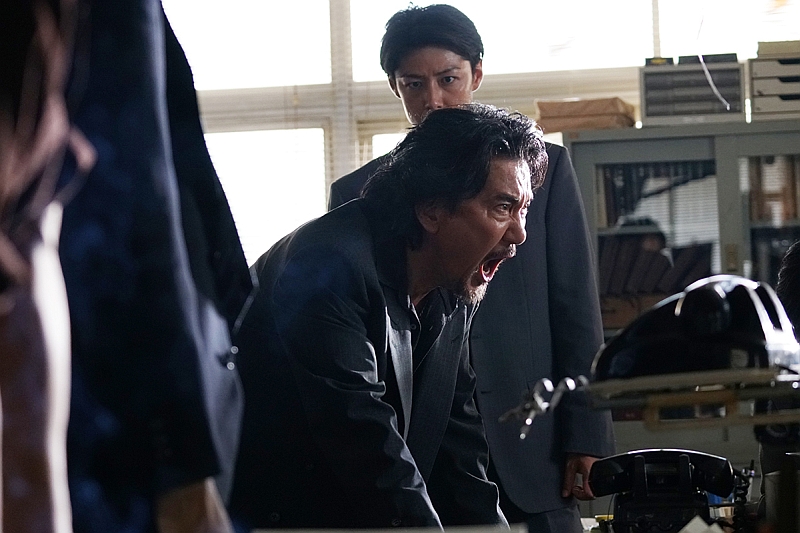
Yakusho goes ballistic, brilliantly. © 2018 THE BLOOD OF WOLVES Production Committee
The Blood of Wolves immerses us in the dog-eat-dog world of Hiroshima at a time when internecine battles between rival yakuza clans could engulf the city at any moment. Detective Shogo Ogami (Yakusho) seems to be the only one holding the place together, using collusion, theft, torture, arson —whatever it takes — to keep the gangs “neutered.” The maverick detective, volatile and unpredictable, has no qualms about bending the law if it will help rein in the gang warfare. Favoring wide-collared polka-dot shirts and sunglasses, and ravenous like the wolf of his name, Ogami is dogged by rumors that he’s in cahoots with the mob.
After a recent transfer from headquarters, rookie cop Shuichi Hioka (Tori Matsuzaka) has had just about enough of his new partner’s balls-out behavior. “What you’re doing is insane, Ogami! Police officers are supposed to uphold justice,” he yells in exasperation. “You wanna hear my idea of justice?” responds Ogami. “I ain’t got one.” But he later confesses he feels “like an acrobat on a tightrope: lean too far to the gangster side or the cop side, and you fall.”
Hioka secretly records and writes copious notes on his partner’s shockingly unorthodox methods as they investigate the disappearance of a finance company employee, which seems to have kicked off the latest conflict. Scrambling to retain his own sense of honor and humanity (codes that once governed both cops and criminals), Hioka gradually finds himself in over his head, swept up by Ogami’s maelstrom of raw brutality, scrambling to halt the eye-for-an-eye clan vengeance. But just as Hioka is ready to present his evidence to Internal Affairs, the rogue detective disappears and the hounds of hell are unleashed…
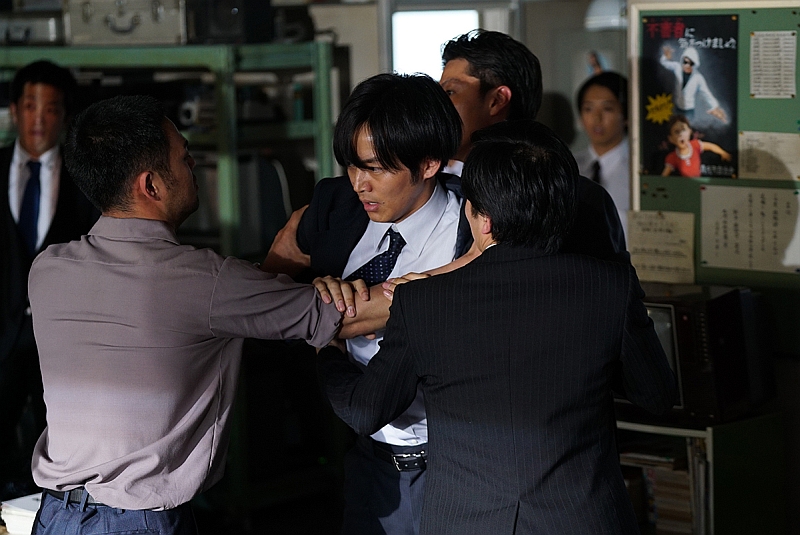
Matsuzaka has an Ogami-like moment. © 2018 THE BLOOD OF WOLVES Production Committee
Noting that the film is “very exciting, but also very confusing” (a fair criticism, considering the intricately woven plot strands, complicated relationships between gangs, enormous cast of characters who appear fleetingly, and the frequent necessity for multiple English titles on screen at once) one FCCJ audience member asked for some elucidation of the film’s themes. Responded Shiraishi, “One very big theme is the notion of personal justice. This takes place in 1988, the final year of the Showa era, and these days we still speak of the ‘Showa Male.’ It was an era of many historical upheavals, such as World War II. The number of people who lived during those times has dwindled, and their way of life is also disappearing. I wanted to capture the Showa Male and the Showa way of life in this film.”
Said Yuzuki, “What I wanted to depict in the original novel was a universal theme: what human beings are like and how they live. Life, with all its trials and tribulations, still compels us to survive. It’s about survival.”
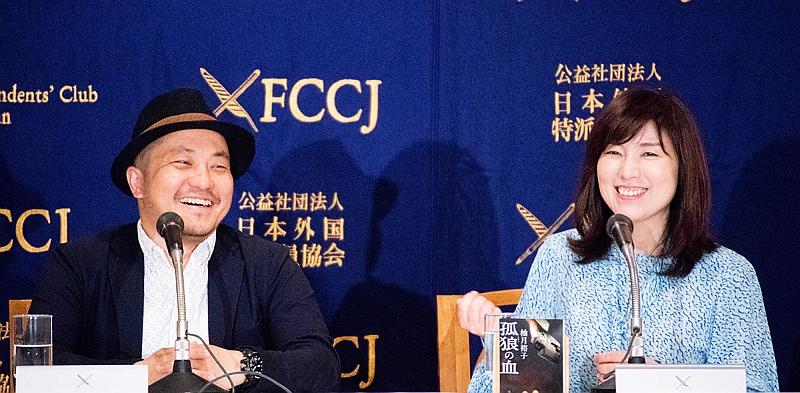
©Koichi Mori
Another journalist sought clarification: do they think that survival is more difficult in 2018 than it was in 1988? “I think it’s rather more difficult to get by in 2018,” said Shiraishi, “because we’re not allowed to express ourselves or speak our minds. It’s a little more suffocating now than it was in 1988. But that was the time just before the Anti-Organized Crime Law kicked in, so for the yakuza, it was a time when it became increasingly difficult to do business and get by. But it was a time when the yakuza were active, and had more power than the police. So it’s easier to depict the life-and-death [struggle] during that period.”
Explained Yuzuki, “I set the story in Showa 63 [1988] because there were still various ties between the yakuza and the police. There was a gray zone, so I could depict the kinds of clashes and connections they had. Right now, I think everything is much more black and white. So it makes the era of the story easier to depict. Going back to the theme of pain and suffering we encounter in life, those are timeless things. Because of various economic factors and war, they haven’t changed in 20 years. Even if this story is set in the late 1980s, the audience can still relate.”
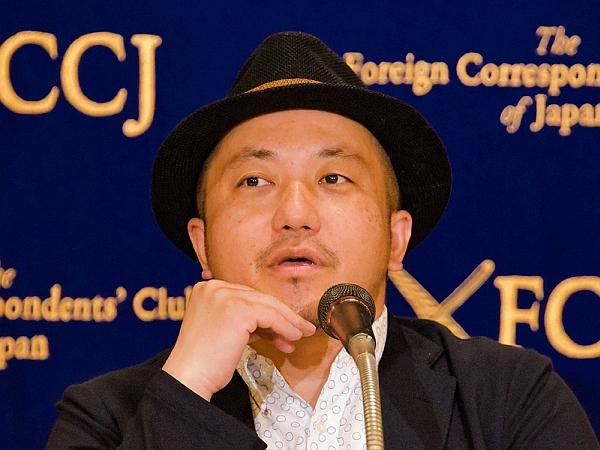
©FCCJ
Pointing out that in Battles Without Honor and Humanity, Hiroshima’s position as the site of the atomic bombing “loomed large,” one audience member inquired what the writer and director thought it represented in The Blood of Wolves. Responded Yuzuki, “Before I started writing the book, I went to Hiroshima to do some research. What really struck me was the power of the Hiroshima dialect. It’s very powerful. While I was in town, I went to the Hiroshima Peace Memorial Museum and saw the absolute destruction that was wrought on Hiroshima. When I left the museum, the was sun shining and people were walking along the street, smiling and laughing, and it struck me how much determination it took to get us here, to this age. And I decided that I had to set the novel there, and include the Hiroshima dialect.”
Shiraishi smiled. “I remember watching the Battles Without Honor and Humanity series when I was a teen, and I assumed all yakuza spoke in the Hiroshima dialect. When the screenplay was written and we showed it to all our actors, I didn’t have to explain, they all understood what we wanted to do. I think that’s due to the wonderful films that Toei made in the past; they’ve been a guiding light for us. Under the influence of all those films, I thought Hiroshima must be filled with yakuza, but at the risk of angering Hiroshima citizens, I’ll just say that I found it to be a wonderful town.”
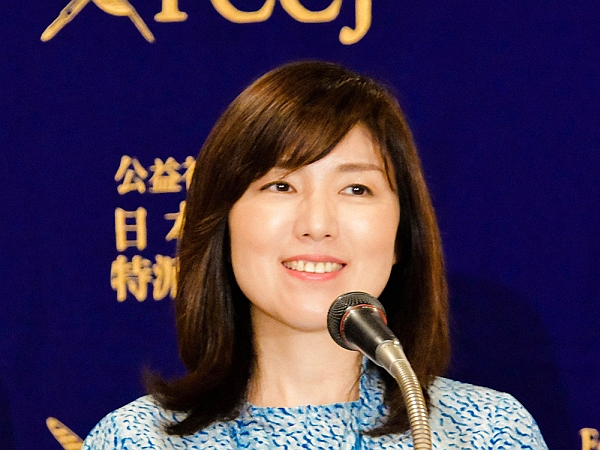
©FCCJ
Asked whether she felt her gender had “delivered a revitalizing jolt to the genre,” as has been widely hyped, Yuzuki said, “As a writer, I’m not all that aware of gender. But what I often find gender-specific in Japan is the way that [friendships are formed.] Women seek friends who share the same values, while men, even if their values are 90% different, if there’s one thing that they can share, they can see eye to eye. That’s what I find really appealing about the male world. That’s the kind of relationship I wanted to depict, and I wanted to make the male characters as masculine as possible.”
Shiraishi’s Twisted Justice screenwriter, Junya Ikegami, adapted Yuzuki’s book for the film, and the author admitted, “There were a few scenes that the director played around with. One scene was the pearl scene, which wasn’t in the novel. Also, the line that [actor] Renji Ishibashi says, ‘Coinkydoink, coincidence, cli—’ [she stops before uttering the full, potentially offensive, word], was not included in the novel. I really thought the director outdid me on those types of things.” She laughed, “I’ll try harder next time.”
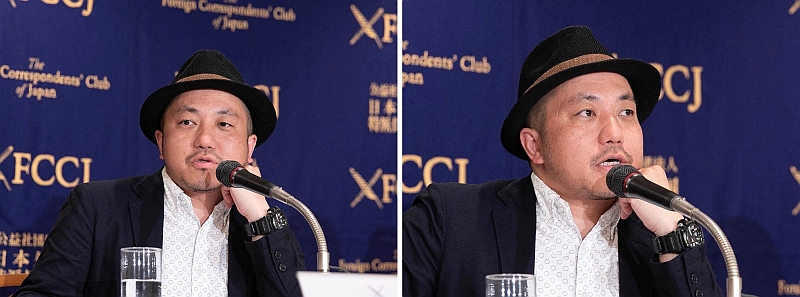
©Mance Thompson
Shiraishi said, “I mentioned that there are very few yakuza films out there besides the Outrage series, and those films were hits. Without Ms. Yuzuki writing the novel, there wasn’t much opportunity for Toei to venture back into the yakuza genre. If this film becomes a hit, hopefully, if Ms. Yuzuki wants me to direct the sequel, I’d be more than happy to take on that role.” Here, Yuzuki interjected, “Soshiso ai!” a passionate expression that we’ll interpret to mean “You know I would!”
Shiraishi continued, “The [cigarette] lighter that ultimately went to Tori Matsuzaka in the film — he actually took that home with him. He said, ‘I’m gonna keep this until the next time we meet.’ So if there’s another project with this series, I would be more than happy to take up the challenge.”
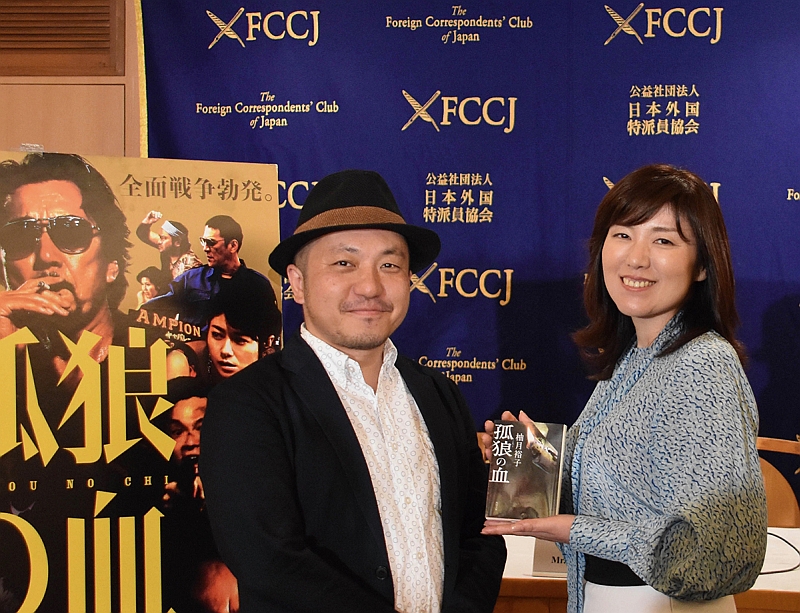
©FCCJ
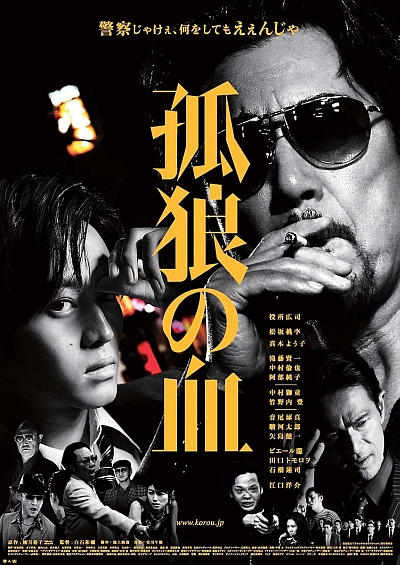
© 2018 THE BLOOD OF WOLVES Production Committee
Posted by Karen Severns, Thursday, May 10, 2018
Selected Media Exposure
- 日本のYAKUZAに外国人記者が愕然 映画『孤狼の血』外国特派員協会会見
- 外国人記者80人が日本文化に驚愕!映画『孤狼の血』外国特派員協会会見・開催
- 「孤狼の血」白石和彌が“やらかした”描写に原作者・柚月裕子「敵いませんでした」
- 白石和彌監督、『孤狼の血』続編も意欲 原作者と“相思相愛”
- 映画「孤狼の血」公開記念特集④ 「孤狼の血」日本外国特派員協会試写、海外展開にも注目!
Read more
Published in: May
Tag: Kazuya Shiraishi, Yuko Yuzuki, yakuza, Hiroshima, Koji Yakusho, awardwinning, Kinji Fukasaku, Battles Without Honor and Humanity
Comments

